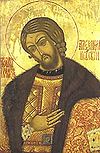- Konstantin Leontiev
-
Konstantin Nikolayevich Leontyev (Russian: Константин Николаевич Леонтьев) (1831–1891) was a conservative, monarchist reactionary Russian philosopher who advocated closer cultural ties between Russia and the East in order to oppose the catastrophic egalitarian, utilitarian and revolutionary influences from the West. He advocated Russia's cultural and territorial expansion eastward to India, Tibet, and China.
Contents
Biography
Leontiev was born and grew up on his father's estate. His father, a nobleman, was a military officer who was discharged due to "riotous behavior." Despite this fact, due to the intervention of Russian Empress Leontiev's brothers were able to enter imperial Corps of Pages. He was engaged at the age of twenty-three but broke off this relationship for the sake of "freedom and art," a decision that made things difficult for him. After completing medical school in Moscow Leontiev saw service as a doctor during the Crimean War. In 1861, he carried off a local Crimean girl, the daughter of a Greek merchant, from Feodosia, eventually marrying her.
He later lived in various Ottoman towns as a Russian consular agent, devoting his leisure time to writing oriental fiction on many themes, some of which included a condemnation of homophobia and implied that he may have been bisexual.[1] [2] In the summer of 1871, after praying to the Virgin Mary, he was cured of cholera and dysentary and promised Her that he would take monastic vows. Later that fall he moved to the Russian monastery on Mount Athos. In 1880, he moved to the censorship department in Moscow, where he published several acclaimed analyses of Leo Tolstoy's novels. Seven years later, he secretly took the tonsure at the Optina monastery, famous for its startsy. He died as a monk in the Troitse-Sergiyeva Lavra.
Works and political thought
Leontiev's most remarkable book is a volume of essays entitled The East, Russia, and Slavdom (1885-86). Like Nikolay Danilevsky and Fyodor Dostoyevsky before him, he was ill at ease with the Western consumer society and the cult of material prosperity. Leontyev regarded traditional Russian Byzantism as a blessing and a strong antidote against further liberalisation of the country's society. His aesthetic and political theories had some similarities to those of Friedrich Nietzsche and Oswald Spengler. Preceding the latter's theory of the cyclical nature of civilizations and the West's decline by several decades, Leontiev proposed that all societies undergo a state of flowering and increasing complexity followed by one of "secondary simplification", decay and ultimately death. Leontiev felt that the West had reached the beginning of the latter stage.
A pessimist, Leontiev made several predictions that turned out to come true. He prophesied that in the next, that is twentieth century, there would be a bloody revolution in Russia led by an "anti-Christ" that would be socialist and tyrannical in nature, and whose rulers would wield more power than their tsarist predecessors. He said that "Socialism is the feudalism of the future" [3] He felt that only the harshest reaction could prevent this scenario. Leontiev also predicted that Germany would grow strong enough to make one or two, but no more, wars and that China would one day threaten Russia's power. He also claimed that technology would one day lead to universal destruction.
See also
- Russian philosophy
- Sobornost
Bibliography
- Against the Current: Selected Writings, Konstantin Leontiev, Wybright and Talley Publishers, New York, 1969.
Notes
- ^ "Russian Literature". glbtq.com. http://www.glbtq.com/literature/russ_lit,5.html.
- ^ Nicholas Rzhevsky. (1983). Russian literature and ideology: Herzen, Dostoevsky, Leontiev, Tolstoy, Fadeyev. Champaign, Illinois: University of Illinois Press
- ^ Robert Conquest, The Harvest of Sorrow: Soviet Collectivization and the Terror-Famine Oxford University Press New York (1986) ISBN 0-195-04054-6
External links
- Narod.ru (Russian)
- Pravoslavie.ru (Russian)
People from Russia Leaders and religious - Pre-1168
- 1168–1917
- 1922–1991
- 1991–present
- RSFSR leaders
- General secretaries
- Soviet premiers (1st deputies)
- Soviet heads of state (and their spouses)
- Prime ministers (1st deputies)
- Foreign ministers
- Prosecutors general
- Metropolitans and patriarchs
- Saints

Military and explorers - Field marshals
- Soviet marshals
- Admirals
- Aviators
- Cosmonauts
Scientists and inventors - Aerospace engineers
- Astronomers and astrophysicists
- Biologists
- Chemists
- Earth scientists
- Electrical engineers
- IT developers
- Linguists and philologists
- Mathematicians
- Naval engineers
- Physicians and psychologists
- Physicists
- Weaponry makers
Artists and writers Sportspeople - Chess players
Categories:- 1831 births
- 1891 deaths
- Russian philosophers
- Russian religious figures
- Russian writers
- Slavophiles
Wikimedia Foundation. 2010.

